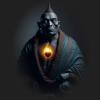 Submitted by Aesch Mezareph on
Submitted by Aesch Mezareph on

By Rama - Own work, CC BY-SA 2.0 fr, https://commons.wikimedia.org/w/index.php?curid=8475076
Alphonse-Louis Constant better known as Eliphas Levi was constantly searching for a cause. When he was young he devoted himself to the Church then to revolutionary politics, but it was only when he met the exiled Polish mystic J.M. Hoene-Wronski that he found his life's work - to become the world's foremost ritual magician.

Public Domain, https://commons.wikimedia.org/w/index.php?curid=548820
J. M. Hoene-Wronski (1776-1853) was the first occult teacher to inspire the French writer who called himself Eliphas Levi. Wronski was originally a soldier by profession but abandoned the military for philosophy and science making his way to France where he supported himself teaching mathematics. By 1810, he had come to believe that he had "discovered the Absolute" - in other words, that he had come, through reason to a perfect understanding of the nature of ultimate reality and truth. He expressed this supposed 'understanding' in mathematical formulae that proved incomprehensible not only to laymen but to other mathematicians. Nevertheless, convinced of his own genius he visited London in order to petition Parliament for grants and subsidies. Here he made such a nuisance of himself that one distinguished mathematician, a member of the scientific committee known as the Board of Longitude, opined that, "in the interest of social order one must hope that Wronski will one night go to bed and not wake up the next day." This gentleman's distaste for Wronski would probably have been stronger if he had realized that the Polish savant was an occultist and mystic, a student of such strange subjects as gnosticism and qabalism, who believed by means of mystical processes ordinary human beings could attain God-like powers.
In 1850, Wronski met Alphonse- Louis Constant better known as Eliphas Levi, a hack journalist who had once trained for the priesthood but lost his faith, dabbled in revolutionary politics and became disillusioned, and was looking for a new set of beliefs that would give meaning to his powerless existance. To Levi - to use the name he adopted - Wronski expounded on his doctrine of the Absolute, his belief that Poland was the "Christ of Europe," his interpretations of the qabalah and other mystical systems, and his belief that, through the practice of ritual magic, men could attain semi-divinity.
Levi was captivated. He threw himself in the study of all the occult sciences, from alchemy to cartomancy, from magic to astrology. He rifled the libraries of Paris for esoteric books and mauscripts, reading them voraciously, and spent many hours with obscure soothsayers, diviners, magicians and self appointed prophets, hoping to extract wisdom from his long and often pointless conversations with them. He came to believe the ancient texts of alchemy and magic were written in symbolic code, and that if he could only break this code he would learn the ultimate secrets of the universe and become the custodian of spiritual truths beside which the discoveries and interpretations of Wronski would pale into insignificance.
In 1853, Wronski died, mourned but not deeply regretted by Levi who by that time believed he had already surpassed his former master and was well on his way to receiving some great spiritual revelation. A year later, in1854, he decided that his researches were sufficiently advanced for him to carry out an occult experiment - the 'evocation to visible appearance' of the spirit of Apollonius of Tyana, a philsopher and wonder worker of the firt century. Levi recorded that he prefaced this rite by three weeks of preparation and purfication - eating only vegetables, avoiding other people and carrying on imaginary conversations with the long dead sage. And invoke him he allegedly did, three times gaining profoundly philosophical answers to questions. Unfortunately the exact wording of neither the questions propounded or the answers received was recorded. Levi claimed Apollonius revealed secrets 'which might change, in a short time, the laws of society at large, if they became generally known.' As remarkable as these 'secrets' were, Levi warned others against carrying out similar occult experiments.
" ... I regard the practice as destructive and dangerous ... I commend the greatest caution to those who propose devoting themselves to similar experiences; their result is intense exhaustion, and frequently a shock sufficient to occasion illness."
Not many months after the incident, Levi wrote The dogma of high magic and its sequel The ritual of high magic, both containing distortions attributed to others such as Paraceslus. inaccuracies of this sort flawed all the literary works of Levi and anyone who looks for reliable accounts of the history of Western occultism and techniques empoyed by its devotees must seek elsewhere.
Perhaps he drifted too far from the musings of his mentor.
Thank you for your attention -
Aesch Mezareph
Resource: Laying down the lore, pgs 1669-1673, Mysteries of Mind, Space and Time, vo. 14
- 3211 reads